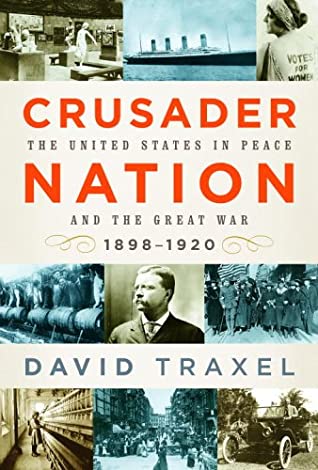

 |

|

The average rating for Crusader nation based on 2 reviews is 4 stars.
Review # 1 was written on 2021-03-17 00:00:00 Mike Russo Mike RussoHonestly, I picked this up from a bargain table and expected (particularly with a review quote from Doris Kearns Goodwin) it to be an endless drumbeat of "reformers = angels, opposing viewpoints = devils. But this author, in addition to having a VERY engaging writing style and extensive researching, did a remarkable job of including ALL facets of American life with a very even-handed approach. Every character was given equitable treatment regarding both their foibles and admirable qualities and the only outright bad guys were the Kaiser's government in WWI. It was a very easy and enjoyable read! |
Review # 2 was written on 2013-10-23 00:00:00 Jos Heinricy Jos HeinricyDavid Traxel’s engagingly written narrative history of the United States in the early twentieth century offers some of the pleasures and frustrations of having your garrulous, opinionated grandfather take you through his old scrapbooks. At times you catch flashes of the past as people actually lived it, with the color and vitality that textbooks rarely convey, but you also sense that you’re getting an impressionistic and selective view of the era. The period from 1898 to 1920 was one of the most transformative in American history, as the country became an imperialist power, undertook major social and political reform under the banner of progressivism, fizzed with cultural ferment, and threw itself into the mechanized slaughter of the Great War. As Traxel writes, the country “was awash in newness,” including “a New Music, New Theater, New Art, New Psychology, New Morals, New Immigration. A New Man strutted along the boulevards, accompanied, or on occasion brushed aside, by a New Woman.” Traxel tries to bring the many strands of the time together in the persons of presidents Theodore Roosevelt and Woodrow Wilson (who opposed each other in the 1912 election that pitted Roosevelt’s New Nationalism against Wilson’s New Freedom), radical journalist John Reed, and automaker Henry Ford. This central cast allows him to relate the political drama through Wilson and TR, and industrial development and the antiwar movement through Ford (who sponsored a journey of peace activists to Europe in 1915 in a forlorn attempt to end the war). Reed’s story encompasses bohemianism, labor unrest, Mexican insurgency, and the Bolshevik revolution in Russia. The book also includes cameos of other representative figures ranging from social worker Jane Addams to composer Irving Berlin to General John Pershing. Traxel constructs his survey largely by combing through older histories and memoirs, with a magpie sense for eye-catching detail. He leavens the narrative with excerpts from novels, doggerel, jokes, songs, gossip, and even a nude photograph of Louise Bryant in the dunes of Provincetown, where she was simultaneously the lover of Reed and playwright Eugene O’Neill. He presents illuminating vignettes of the 1913 Madison Square Garden pageant in support of striking mill workers, the sinking of the Lusitania, and Pancho Villa’s border raids, and offers up curios like the fact that the assassination of Archduke Ferdinand (which touched off World War I) attracted much less attention at the time than the trial of a French politician’s wife accused of killing a conservative journalist. Crusader Nation ultimately provides an enjoyable but idiosyncratic and incomplete portrait of the era. Nine-tenths of the book takes place in the six-year period 1912-18, and neglects important subjects such as the Philippine War, the Triangle fire, the eugenics movement, the Sacco and Vanzetti trial, and Upton Sinclair’s consumer-revolting novel The Jungle, to name a few. The book’s title suggests that crusading defines the American character, a provocative charge to make in 2005 given that much of the world considered the U.S. occupation of Iraq to be an ideologically-driven crusade. Traxel also offers the tantalizing implication that in progressive efforts to “stop child labor and other exploitive employer practices, extend democracy through votes for women, rein in irresponsible plutocrats, expel corrupt big-city machines, and prohibit the social evil of alcohol” there may be lessons for our own politically polarized debates. Reformers and their opponents alike, he notes, had “faith in their particular visions of society and fought to establish these with a passionate intensity that often blinded them to other points of view.” But Traxel doesn’t penetrate deeply enough into the movements of the era – he devotes a page or two to the campaigns for temperance and women’s suffrage, as opposed to thirty-five pages on events in Mexico – to distinguish between reform and zealotry. It’s true that the government proclaimed American participation in the Great War to be a holy crusade to save civilization and democracy, even going so far as to produce a documentary entitled Pershing’s Crusaders. But the government had to resort to propaganda to make this claim precisely because so many citizens were opposed to the war, and in any case the European belligerents were no less crusade-minded than the Americans. Traxel’s book is a brave attempt to recapture the grand sweep of the past in all its richness and strangeness, an effort more often undertaken these days by historical novelists than academics – and it’s telling that Crusader Nation’s bibliography lists only half a dozen histories produced in the last five years. But better still would be to combine Traxel’s storytelling ability with more scholarly analysis to emerge with a synthesis that speaks more directly to who we were, and are, as a nation. |
CAN'T FIND WHAT YOU'RE LOOKING FOR? CLICK HERE!!!